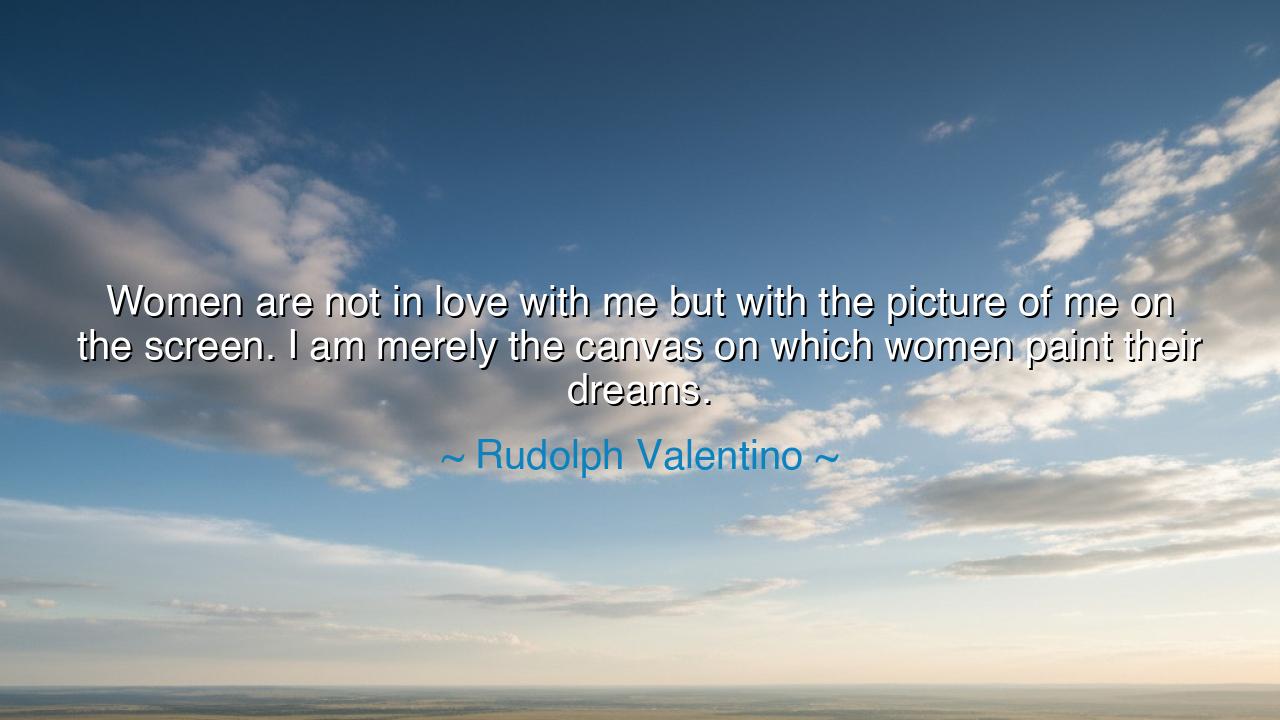
Women are not in love with me but with the picture of me on the
Women are not in love with me but with the picture of me on the screen. I am merely the canvas on which women paint their dreams.






“Women are not in love with me but with the picture of me on the screen. I am merely the canvas on which women paint their dreams.” Thus spoke Rudolph Valentino, the silent god of early cinema, whose eyes haunted the dreams of a generation and whose face became a symbol of impossible romance. In these words lies not the vanity of a star, but the humility of a man who understood the fragile boundary between illusion and truth, between the image and the self. He saw that what people love in an idol is not the person, but the reflection of their own longing — that the star’s radiance is not his own light, but the light of human desire cast upon him.
Valentino, born Rodolfo Pietro Filiberto Raffaello Guglielmi, rose from obscurity to become one of the first true icons of the silver screen. His films, The Sheik and Blood and Sand, captured the hearts of millions. To women across the world, he was not a man, but a myth — the embodiment of passion, elegance, and mystery. Yet he himself knew the truth that few ever see: that fame, for all its brightness, often hides the loneliness of being adored for what one is not. His quote is an act of revelation — a confession from the heart of one who understood that the world loved not him, but the dream they made of him.
To say, “I am merely the canvas on which women paint their dreams,” is to speak to the very nature of art and human imagination. The actor, the artist, the hero — all become mirrors of the soul’s desire. People do not love the performer for who he is, but for what he represents: courage, romance, beauty, escape, transcendence. The audience sees in the star their own yearnings reflected back in glorious form. In this way, Valentino becomes a metaphor for all creators, all leaders, all who inspire: they are not worshiped for their essence, but for the dreams they awaken in others.
This truth stretches far beyond the theater. In every age, the great figures of history have stood as canvases upon which humanity painted its ideals. Consider Alexander the Great, whose soldiers did not follow him merely because he was mortal flesh, but because he embodied the idea of glory. Or think of Joan of Arc, whose followers saw in her not just a young woman, but the incarnation of divine courage. Each became a vessel for collective yearning, a symbol greater than themselves. Valentino’s words remind us that even in admiration, we project our deepest hopes onto those who seem larger than life.
There is, too, a melancholy in his reflection — for to be loved as an image is to be unseen as a person. Valentino, idolized by millions, lived and died misunderstood, trapped within the very myth that made him immortal. In his awareness we hear the ancient lament of those who bear the burden of illusion: the actor who cannot step off the stage, the king who cannot remove his crown. He teaches us that to be adored without being known is a form of loneliness — that the heart, no matter how adored, yearns always for authenticity.
Yet beneath the sorrow lies a profound wisdom. Valentino’s humility reveals the secret strength of the artist: he understands that art belongs not to the creator, but to those who receive it. The painter’s work, once finished, becomes the dream of others. The poet’s words, once read, belong to the reader’s heart. The actor’s image becomes the language through which humanity speaks its desires. In this way, the artist becomes eternal, not by owning his creation, but by releasing it into the world. Valentino’s canvas is not his loss, but his legacy — for in being the dream of millions, he transcended the limits of self and became part of the collective soul.
Let this be the lesson: whether you are artist or admirer, remember that what we love in others is often the reflection of what we seek within ourselves. We paint our longings upon every face we admire, every story we cherish, every star that shines above us. Therefore, seek not to possess the image, but to understand the truth it reveals about your own heart. And if you are the one who stands as a symbol — a leader, a creator, or simply one who inspires — hold humility as your companion. Know, as Valentino knew, that your greatness lies not in being adored, but in awakening beauty, courage, and imagination in others.
For in the end, the artist fades, the actor dies, the star falls — but the dreams they awaken endure forever. And that, perhaps, is the truest immortality.






AAdministratorAdministrator
Welcome, honored guests. Please leave a comment, we will respond soon